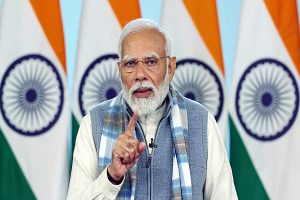Nobel prize winners Abhijit Banerjee and Esther Duflo who received their Nobel Prize medals and diplomas on Wednesday, gifted two important pieces to the Nobel Prize Museum in Stockholm, associated with their research. They gifted two bags made by women from Ghana and three books for children published by voluntary group Pratham in India.
Economist couple Dr Banerjee and Dr Duflo, who on Tuesday received Sveriges Riksbank Prize in Economic Sciences in Memory of Alfred Nobel from King Carl Gustaf, also paid a customary visit to the museum in the Stortorget in Gamla Stan, old town area here as part of the Nobel week celebrations. The Nobel Week lasts from December 6-14.
Dr Banerjee and Dr Duflo, who work at the prestigious Massachusetts Institute of Technology, won the 2019 Nobel Economics Prize along with another economist Michael Kremer on October 14, “for their experimental approach to alleviating global poverty.”
Banerjee is married to Duflo and the couple wore traditional Indian attire for the occasion. Abhijit wore a black bandhgala jacket paired with an off-white dhoti, and wife Esther wore a blue, two-toned saree, while Michael Kremer was spotted wearing a black suit.
The couple had brought individual gifts for the museum, housed in an erstwhile stock exchange building, as part of a custom where Nobel winners have to gift something intrinsic to their work.
From one of his research projects, Dr Banerjee donated two bags produced by women living under poverty in Ghana while Dr Duflo brought three school books for children from a voluntary group Pratham in India.
“Duflo cooperated with when she led her first field experiment. The books are part of the project “Teaching at the right level,” Rebecka Oxelstrom, press officer, said.
The couple also signed a chair, another custom at the museum. The items that they donated helps the museum to tell the stories about their achievements and the research that has led to them being awarded the prize and we are very happy about that, she said.
“The artefacts that we receive awaken great curiosity and give our museum visitors an opportunity to learn more about the discoveries and works that the Laureates are awarded the Nobel Prize for. The Laureates” stories about the artefacts also bring us closer to the person behind a prize,” says Erika Lanner, Director of Nobel Prize Museum.
The museum, set up in 2001, also houses a cycle donated by Amartya Sen, Nobel laureate in economics in 1998 and a kurta from Kailash Satyarthi, winner of the Nobel Peace Prize in 2014.












